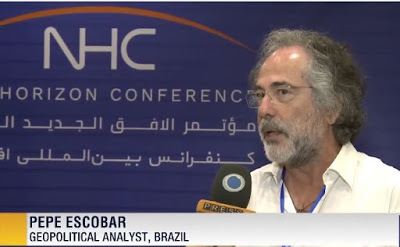How Yemen’s Houthis are bringing down a Goliath
 |
| Pepe Escobar 27/09/2019 |
‘From a military perspective, nobody ever took our forces in Yemen seriously,’ scholar says
“It is clear to us that Iran bears responsibility for this attack. There is no other plausible explanation. We support ongoing investigations to establish further details.”
The statement above was not written by Franz Kafka. In fact, it was written by a Kafka derivative: Brussels-based European bureaucracy. The Merkel-Macron-Johnson trio, representing Germany, France and the UK, seems to know what no “ongoing investigation” has unearthed: that Tehran was definitively responsible for the twin aerial strikes on Saudi oil installations.
“There is no other plausible explanation” translates as the occultation of Yemen. Yemen only features as the pounding ground of a vicious Saudi war, de facto supported by Washington and London and conducted with US and UK weapons, which has generated a horrendous humanitarian crisis.
So Iran is the culprit, no evidence provided, end of story, even if the “investigation continues.”
Hassan Ali Al-Emad, Yemeni scholar and the son of a prominent tribal leader with ascendance over ten clans, begs to differ. “From a military perspective, nobody ever took our forces in Yemen seriously. Perhaps they started understanding it when our missiles hit Aramco.”
Al-Emad said: “Yemeni people have been encircled by an embargo. Why are Yemeni airports still closed? Children are dying without treatment. In this current war, the first door [to be closed against enemies] was Damascus. The second door is Yemen.” Al-Emad considers that Hezbollah’s Secretary-General Sayed Nasrallah and the Houthis are involved in the same struggle.
Al-Emad was born in Sana’a in a Zaydi family influenced by Wahhabi practices. Yet when he was 20, in 1997, he converted to Ahlulbayat after comparative studies between Sunni, Zaydi and the Imamiyyah – the branch of Shi’ite Islam that believes in 12 imams. He abandoned Zaydi in what could be considered a Voltairean act: because the sect cannot withstand critical analysis.
I talked and broke bread – and hummus – with Al-Emad, in Beirut, during the New Horizon conference among scholars from Lebanon, Iran, Italy, Canada, Russia and Germany. Although he says he cannot get into detail about military secrets, he confirmed: “Past Yemeni governments had missiles, but after 9/11 Yemen was banned from buying weapons from Russia. But we still had 400 missiles in warehouses in South Yemen. We used 200 Scuds – the rest is still there [laughs].”
Al-Emad breaks down Houthi weaponry into three categories: the old missile stock; cannibalized missiles using different spare parts (“transformation made in Yemen”); and those with new technology that use reverse engineering. He stressed: “We accept help from everybody,” which suggests that not only Tehran and Hezbollah are pitching in.


